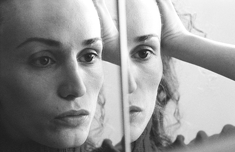A trio of misbegotten lovers fashion an arrangement, of sorts, that defies gender and sexual norms
Pierre Caumon lives in Paris. He came to the big city as a teenager looking for work, escaping his forlorn village in the bleak north of France. Pierre is also Stephanie (Stephanie Michelini), a transsexual prostitute working the boulevards and apartment blocks in the City of Light, a delicate, beautiful wisp of a creature who projects a wrenching vulnerability.
Now in her early 30s, Stephanie is one of the reigning divas in the “trans” club scene. She lives with Jamel (Yasmine Belmadi), a handsome North African who turns tricks with men and women, mostly quick encounters in public toilets for a few euros. He and Stephanie are soul mates and bed partners, two fragile sparrows huddling together for love and warmth in the heartless urban jungle that is modern Paris.
One day on the street, Stephanie meets Mikhail (Edouard Nikitine), an illegal Russian immigrant from Odessa. He is handsome in a rough, irregular way. He speaks no French and only a smattering of English. They go to Stephanie’s apartment and have sex. Their coupling turns out to be more than just a quickie. Despite the language barrier, they fall for each other.
Thus begins the love triangle that is at the heart of the film “Wild Side.” Stephanie, Jamel and Mikhail share an intimate ménage. When Stephanie is “at work” the guys hang out. They play football together in the apartment, knocking a soccer ball from head to head. Mikhail is a pugilist and teaches Jamel how to box. As they spar, they bond as men and lovers, usually ending up in each other’s arms. There are some cute, funny exchanges as Jamel struggles to teach Mikhail French by using his own non-existent English. Jamel says “année,” meaning year, and Mikhail understands “honey.”
The phone rings and a voice asks for “Pierre.” Jamel says, “Sorry wrong number” and hangs up, unaware of Stephanie’s birth name. Again the phone rings. This time Stephanie picks up and learns that her mother is ill and is asking for her. She and Mikhail go to her village, now a nearly deserted ghost town. She nurses her mother, Liliane (Josiane Storelu), and they discuss why Stephanie has become who she is and why she left her family for the city. They come to terms with each other, dispelling the anger and disappointment felt by a parent for a child who seemingly deserted her.
Liliane reflects that it is perhaps good that her husband has passed away and cannot know what has become of his son, Pierre. Stephanie counters by saying, “Maybe Papa just wanted me to be happy.” When Liliane agrees, a Stephanie’s face is overtaken by a peaceful expression and we know that she finally feels accepted by the world or at least by those important to her.
There are touching scenes between Liliane and Mikhail. They struggle to communicate without speaking. Liliane asks to see Mikhail’s hands. She holds them and looks in his eyes and asks him to sing a Russian song. When he finally comprehends her request, he bursts into a simple folk ballad, his face rapt with joy. Later, Jamel shows up at the village and Liliane, the unflappable mother, also accepts this missing piece of the triangle. Stephanie’s comfort within her own skin is reinforced when, by chance, she meets Nicolas, a teenage love she has not seen for 15 years. They walk in a field near the village while his children play in the background and he tells her that she has not really changed.
Inevitably, there are tensions in the ménage a trois as the relationships begin to progress. Jamel confronts Stephanie one evening, asking her who she loves most, “Me or Mikhail?” and “Which one of us is more handsome?” She reassures him that her love is for both of them. As the film fades to finish, they ride the train back to Paris, a loving threesome.
But how can it last? What will become of Stephanie when she is old and loses her looks? Will Mikhail grow tried of performing with her while customers pay to watch?
“Wild Side” is a free-form film, essentially without plot. It is a snap shot of lives in transition that invites viewers to fill in the blanks. A minimum of dialoge and long reflective shots give the viewer space to think about what is really happening in the minds of the actors. A plaintive cello guides us through currents of emotion and we ache for the human condition as these beautiful, lost souls cling to each other, and anyone else who will pay them by the hour.
gaycitynews.com

































